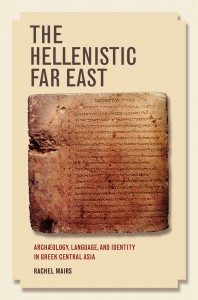 Classics students – and those with a taste for sub-par Oliver Stone movies – will know that Alexander the Great campaigned as far as the very edges of the world as known to the ancient Greeks, in Afghanistan and India. A story which is less well know is that of the military colonists he left behind. Greek and Macedonian soldiers were settled in remote garrisons, as well as ancient cities such as Samarkand and Bactra. For almost three hundred years, the descendants of these soldiers ruled as kings in Central Asia and India, minting coins with Greek legends.
Classics students – and those with a taste for sub-par Oliver Stone movies – will know that Alexander the Great campaigned as far as the very edges of the world as known to the ancient Greeks, in Afghanistan and India. A story which is less well know is that of the military colonists he left behind. Greek and Macedonian soldiers were settled in remote garrisons, as well as ancient cities such as Samarkand and Bactra. For almost three hundred years, the descendants of these soldiers ruled as kings in Central Asia and India, minting coins with Greek legends.
Like many of our current third-year dissertation students, I found that unanswered questions from my undergraduate studies made for a great research project. What happened at the ‘fringes’ of the ancient world? How did Greek settlers interact with local populations? In areas where few ancient written sources survive, what other forms of evidence can we employ in historical research? Why have ancient Greek olive oil jars been excavated in Afghanistan?
My new book The Hellenistic Far East: Archaeology, Language and Identity in Greek Central Asia has just been published by University of California Press. It presents exciting, and little known, textual and archaeological material from Central Asia and India in the period after Alexander the Great. Through this evidence, we can explore a complex, multiethnic, multilingual society in the contact zone between Greek and ‘barbarian’, settled and nomad, East and West.For those interested in finding out more, the Hellenistic Far East blog (www.bactria.org) has regularly updated bibliographical essays.

